
January 18
1778 Cook discovers Hawaii:
On January 18, 1778, the [British] explorer Captain James Cook becomes the first European to discover the Hawaiian Islands when he sails past the island of Oahu. Two days later, he landed at Waimea on the island of Kauai and named the island group the Sandwich Islands, in honor of John Montague, who was the earl of Sandwich and one of his patrons. [For further details, Click here.]
1871 The Second Reich is proclaimed in the Hall of Mirrors at Versailles, France, as Wilhelm I of Prussia becomes Kaiser (emperor). This was consequent upon the defeat of France in the Franco-Prussian War, which they had unwisely declared. 1907 Klara Hitler: After having been admitted the day before, Klara Hitler has a mastectomy at the Sisters of Mercy Hospital in Linz. The operation is performed by Dr. Karl Urban, chief of the surgical staff, together with his assistant and, at Klara's request, with Dr. Bloch, the Hitler's Jewish family doctor, present in the operating theater. The operation itself costs about 100 kronen, with another 50 kronen for the nineteen day hospital stay and with a total of a further 60 kronen for subsequent treatments by Dr. Bloch. [For further details, Click here.] 1908 Klara Hitler's official death record [See December 21, 1907] is drawn up, detailing that the funeral and the "hard polished wooden coffin with metal corners" had cost a substantial sum, 370 kronen. This equals almost 10% of the total value of the estate. "Adolf Hitler, art student," Paula, and Aunt Johanna are recorded as still living in the apartment on the Bluetengasse, while Alois II is listed as living in Paris and working as a waiter. Klara Hitler's clothes are determined to be "without value." After all accounts are settled, around 3,000 kronen remain, of which two-thirds go to Angela, who has taken in young Paula Hitler. Adolf's share is put under the partial control of his guardian, Mayor Mayrhofer. 1911 Volkishness: Johannes Hering, a member of the local Hammer group in Munich, the Pan-German League and a close friend of both Guido von List and Jorg Lanz von Liebenfels, writes to Philipp Stauff, the prominent voelkisch journalist, telling him that he has been a Freemason since 1894, but this 'ancient Germanic institution' has been polluted by Jewish and parvenu ideas. He concluded that a revived 'Aryan' lodge would be a great boon to antisemites. (THP ) 1914 Adolf Hitler: A Munich policeman named Herle knocks on Adolf Hitler's door at 3:30 PM to serve Hitler a summons‑-on which his name is misspelled‑-from the military authorities in Linz, Austria, demanding that he present himself for military service: Herr Adolf Hietler [sic], born 1889, domiciled Linz am Donau, presently staying in Munich care of Popp, Schleissheimerstrasse 34/III, is hereby summoned to present himself for military registration at Linz, at 30 Kaiserin Elizabeth Quay, on January 20, 1914; and in the event of his failure to comply with this summons, he will be liable to prosecution under paragraphs 64 and 66 of the Law regarding Military Service of the year 1912.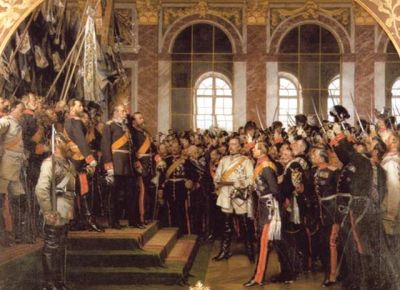

1915 Countdown to Infamy 'Twenty-One Demands' made by Japan to China:
The Chinese Government engage to give full assent to all matters that the Japanese Government may hereafter agree with the German Government respecting the disposition of all the rights, interests and concessions, which, in virtue of treaties or otherwise, Germany possesses vis-a-vis China in relation to the province of Shantung.
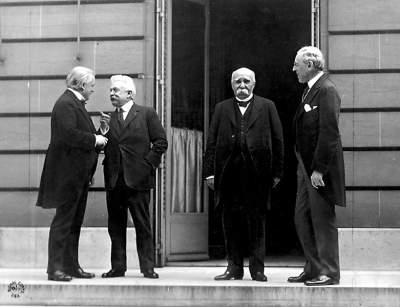
1919 The Versailles Peace Conference (the Paris Peace Conference) officially opens, attended by 70 delegates, representing 27 victorious Allied powers. Neither Germany nor the new Russian Soviet republic is represented. The principal participants are the leaders of the four great powers: Woodrow Wilson of the United States, Georges Clemenceau of France, David Lloyd George of Britain, and Vittorio Orlando of Italy. Woodrow Wilson's Opening Address Nominating Georges Clemenceau as President of the Conference:
This Conference may be considered in some respects as the final crowning of the diplomatic history of the world up to this day, for never have so many nations been represented at the same time to solve problems which in so high a degree interest for the whole world.
Note: Germany is prepared to negotiate on the basis of Wilson's Fourteen Points, but since its representatives are not allowed to attend the conference, it matters little. The Germans are at the mercy of the armistice which they signed of their own free will while their armies were still in the field, and which will be renewed each month for the next six months. The blockade (including foodstuffs) remains in place during that time and conditions deteriorate severely in Germany, creating a residue of bitterness against the Allies that is somewhat misplaced. The actual blame for the conditions in Germany is with Hindenberg and Ludendorf, but the Germans themselves, and especially politicians such as Hitler, will never acknowledge this fact but, instead, will invent the "Stab in the Back" myth against the civilian politicians then in power.
For Poincare's Welcoming Address at Versailles click here.
For Lloyd George's Opening Address click here.
For Sonnino's Opening Address at Versailles click here.
For Clemenceau's Opening Address click here.
For Huddleston on Opening of Peace Conference click here
1927 Weimar: Hitler gives an election address in Schleiz, Thuringia:
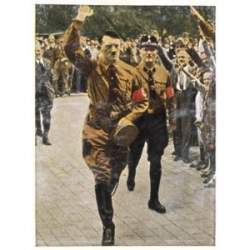
To me the situation of the German nation today seems like that of a sick person. I know that people on various sides often say, "Why do you constantly say that we are sick!" People have said to us: "Daily life goes on as it always did; this "sick person", as you can see, eats day after day, works day in and day out; how can you say that this person is sick?!" But the question is not whether a nation is still alive and the economy functioning. Just because a person eats and works does not mean that he is fit. The most reliable criterion is how that persons himself feels. He can tell whether he is fit or ill. It is precisely the same in the life of nations. Nations are often sick for long periods - often centuries - yet individual members of the nations cannot fully understand the nature of the sickness.
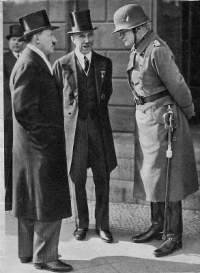
1933 Weimar: Joachim von Ribbentrop arranges a meeting between Franz von Papen and Hitler, with Roehm and Himmler in attendance. Hitler, encouraged by the Nazis strong showing in the Lippe election, increases his demands to include the Chancellorship. When Papen claims that Hindenburg will never allow it, Hitler tells him he can see no use for further talks. After the meeting, Ribbentrop suggests that a meeting be arranged between Hindenburg's son, Oskar, and Hitler.
1941 World War II: Various: Ezra Pound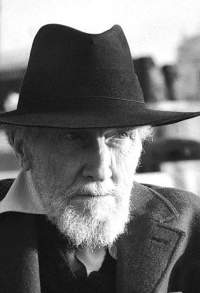
Epinard—one of the greatest race horses of his time—is stolen during the German occupation of France. A newspaper account discloses that the famous equine is being used as a delivery wagon horse.

Romania: Hitler advises Antonescu to 'liquidate' the Romanian Legionary Movement and German forces are soon ordered to help crush the Legionaries.
1942: Various: World War II:
Church and Reich: From a verbal note of the Secretariat of State of the Pope to the German Embassy:
Measures and acts which gravely violate the rights of the Church, being contrary not only to the existing concordats but to the principles of international law ratified by the Second Hague Conference. Yet, despite this keen desire, but often-and this is much more grave-to the very fundamental principles of Divine Law both natural and positive. Let it suffice to recall in this connection, among other things, the changing of the Catholic state elementary schools into undenominational schools; the permanent or temporary closing of many minor seminaries, of not a few major seminaries, and of some theological faculties; the suppression of almost all the private schools and of numerous Catholic boarding schools and colleges; the repudiation, decided upon unilaterally, of financial obligations which the State, municipalities, and so forth, had towards the Church; the increasing difficulties put in the way of the activity of the religious orders and congregations in the spiritual, cultural, and social field, and above all the suppression of abbeys, monasteries, convents, and religious houses in such great numbers that one is led to infer a deliberate intention of rendering impossible the very existence of the orders and congregations in Germany.
1943: World War II: Various: Siege of Leningrad
USA: Commercial bakers stop selling sliced bread. Only whole loaves are sold until the end of the war.
Holocaust: Professor C. Schneider places his first requests for the killing of patients at his research ward in Wiesloch before the Reich Commission for the Registration of Severe Disorders in Childhood. (THP)
Holocaust: Germans resume deportations from Warsaw to Treblinka:
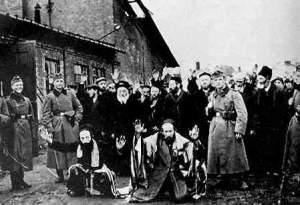
On this day, the deportation of Jews from the Warsaw ghetto to the concentration camp at Treblinka is resumed—but not without much bloodshed and resistance along the way. On July 18, 1942, Heinrich Himmler promoted Auschwitz camp commandant Rudolf Hess to SS major. He also ordered that the Warsaw ghetto, the Jewish quarter constructed by the Nazis upon the occupation of Poland and enclosed first by barbed wire and then by brick walls, be depopulated—a "total cleansing," as he described it. The inhabitants were to be transported to what became a second extermination camp constructed at the railway village of Treblinka, 62 miles northeast of Warsaw. Within the first seven weeks of Himmler's order, more than 250,000 Jews were taken to Treblinka by rail and gassed to death, marking the largest single act of destruction of any population group, Jewish or non-Jewish, civilian or military, in the war. Upon arrival at "T. II," as this second camp at Treblinka was called, prisoners were separated by sex, stripped, and marched into what were described as "bathhouses," but were in fact gas chambers. T. II's first commandant was Dr. Irmfried Eberl, age 32, the man who had headed up the euthanasia program of 1940 and had much experience with the gassing of victims, especially children. He was assisted in his duties by several hundred Ukrainian and about 1,500 Jewish prisoners, who removed gold teeth from victims before hauling the bodies to mass graves. In January 1943, after a four-month hiatus, the deportations started up again. A German SS unit entered the ghetto and began rounding up its denizens—but they did not go without a fight. Six hundred Jews were killed in the streets as they struggled with the Germans. Rebels with smuggled firearms opened fire on the SS troops. The Germans returned fire—machine-gun fire against the Jews' pistol shots. Nine Jewish rebels fell—as did several Germans. The fighting continued for days, with the Jews refusing to surrender and even taking arms from their Germans persecutors in surprise attacks. Amazingly, the Germans withdrew from the ghetto in the face of the unexpected resistance. They likely did not realize how few armed resisters there were, but the fact that resistance was given at all intimidated them. But there was no happy ending. Before this new incursion into the ghetto was over, 6,000 more Jews were transported to their likely deaths at Treblinka.(History.com)
1945 Various: World War II: The Great Soviet Offensive
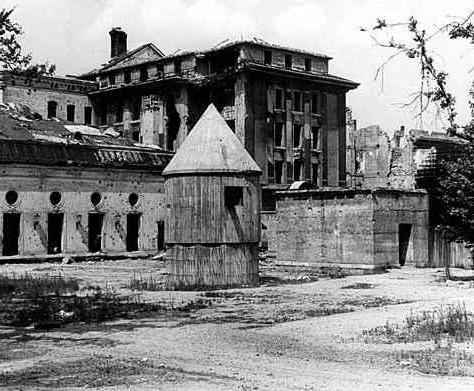
In the inner circle, Hitler was a good boss. In the living quarters and the work room Hitler was a very relaxed man. He had a deep and quiet voice. There was no need to be scared if you made a mistake . . . . Nobody saluted their higher-ranking colleagues within the building. Hitler was the only one who used the military salute. The young people called him Mein Fuehrer, the older called him Herr Hitler, or Boss. (Misch) [See: The Last Days of the Third Reich.]

The Fuehrerbunker below the Chancellery in Berlin was provided with all the necessary equipment for conducting a war. It had the best telephone switchboard in Berlin, permitting Hitler to establish speedy communication with the commanders on all the diminishing fronts. Strangely, the Allies never guessed that he was there and therefore never attempted to destroy the Chancellery with saturation bombing . . . .
The system of bunkers had only recently been completed, and the concrete walls were still damp, the sour smell of wet concrete hanging in the air. This complex of underground bunkers was the safest place in Berlin ... Although these quarters were cramped and spectacularly uncomfortable, Hitler had everything he needed, and he could work as well or as badly underground as he worked in the Berghof or the Reich Chancellery. Maps, secretaries, a telephone exchange, a small compact radio transmitter . . . he needed little more in order to conduct a war.
He liked to work in a small enclosed space, and he liked to have his servants within reach. But while the bunker was perfectly suited to his own temperament, it presented grave difficulties to his military staff, who had to travel daily along difficult and dangerous roads from the military headquarters at Zossen in order to brief him and receive his commands. Sometimes it took them two hours to come to Berlin and two more for the return journey, and so their time was frittered away. As the war drew to a close and Hitler's commands became more erratic and more unreasonable, the generals became increasingly frustrated. They wasted their energies in argument, or in listening to Hitler's exhausting monologues, or is reshaping his orders so that they appeared to be exactly as Hitler had delivered them but were in fact quite different. Hitler's concept of war had not changed. In its simplest form: 'Everyone who gives up any ground must be shot.' [See: Why Did Hitler Insist on No Surrender?]
Slave labor camps: As the evacuation of Auschwitz begins, the Germans issue orders for the immediate evacuation of all slave labor camps in Upper Silesia. Hundreds die of exhaustion, freeze to death, or are murdered by their guards along the way. An internal accounting is made of the remaining prisoners in the assorted labor and concentration camps: Birkenau; 15,058 Jews remain. Auschwitz: 16,226 people remaining, mostly Poles. Monowitz; 10,233 Jews, Poles and assorted prisoners remaining. Factories of Auschwitz: Another 16,000 Jews, Poles and prisoners. The order for immediate evacuation—by forced march, if necessary—is given. [See: How Widespread Was Guilty Knowledge of the Holocaust?]
1946 Nuremberg Tribunal: Day 37:
Continuation of M. Faure's Presentation of France's case.
Beginning of M.Jacques B. Herzog's Presentation of brief relating to forced labor in France:
The resistance of war prisoners caused the German labor bureaus to use a subterfuge to force them to work. I refer to the operation called the transformation of war prisoners into free workers. It consisted in transforming prisoners of war into so-called free workers, to whom a labor contract was offered. The operation was perfected by the Defendant Sauckel in the course of one of his trips to Paris on 9 April 1943. To Germany it offered the advantage of permitting the use of transformed prisoners in armament factories without directly violating the Geneva Convention. For the prisoners it presented only an illusory advantage, the decrease of the surveillance to which they were subjected. In reality the length and the nature of the work imposed upon them was in no way changed; their housing conditions and the quality of their rations remained unchanged. Moreover, this operation, presented by German propaganda as a special measure to war prisoners, brought about a deterioration of their legal status. The prisoners of war were not fooled. [For the full text of today's prceedings, Click here.]
1950 China and Soviet Union recognize Democratic Republic of Vietnam:
People's Republic of China formally recognizes the communist Democratic Republic of Vietnam and agrees to furnish it military assistance; the Soviet Union extended diplomatic recognition to Hanoi on January 30. China and the Soviet Union provided massive military and economic aid to North Vietnam, which enabled North Vietnam to fight first the French and then the Americans. Chinese aid to North Vietnam between 1950 and 1970 is estimated at $20 billion. It is thought that China provided approximately three-quarters of the total military aid given to Hanoi since 1949, with the Soviets providing most of the rest. It would have been impossible for the North Vietnamese to continue the war without the aid from both the Chinese and Soviets. (History.com)
1985 Cold War: United States walks out of World Court case: For the first time since joining the World Court in 1946, the United States walks out of a case. The case that caused the dramatic walkout concerned U.S. paramilitary activities against the Nicaraguan government. [For further information, click here]
Edited by Levi Bookin (Copy editor) Click to join 3rdReichStudies FAIR USE NOTICE: This site may contain copyrighted material the use of which has not always been specifically authorized by the copyright owner. We are making such material available in our efforts to advance understanding of historical, political, human rights, economic, democracy, scientific, environmental, and social justice issues, etc. We believe this constitutes a 'fair use' of any such copyrighted material as provided for in section 107 of the US Copyright Law. In accordance with Title 17 U.S.C. Section 107, the material on this site is distributed without profit to those who have expressed a prior interest in receiving the included information for research and educational purposes. If you wish to use copyrighted material from this site for purposes of your own that go beyond 'fair use', you must obtain permission from the copyright owner. Please note that the list-owner and the moderators are not responsible for, and do not necessarily approve of, the random ads placed on our pages by our web server. They are, unfortunately, the price one pays for a 'free' website.
levi.bookin@gmail.com






